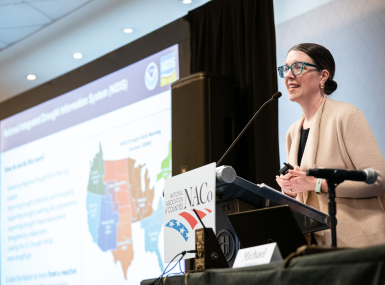EPA opens $2 billion Environmental and Climate Justice Community Change Grants program
Author

Charlotte Mitchell Duyshart
Upcoming Events
Related News

Key Takeaways
On November 21, the U.S. Environmental Protection Agency (EPA) announced $2 billion in funding through the new Environmental and Climate Justice Community Change Grants (Community Change Grants) program.
Established in the Inflation Reduction Act, the program provides funding to carry out climate and environmental justice activities to bring meaningful change to communities negatively affected by climate change, legacy pollution and historical disinvestments.
Are counties eligible for funding?
Yes, if they partner with a community-based nonprofit organization.
What can counties use the grant for?
Counties can apply for Community Change Grant program funding under two different tracks. Projects under both tracks must benefit disadvantaged communities, as defined in Appendix A of the Notice of Funding Opportunity (NOFO).
Track I: Community-Driven Investments for Change
- Objective: To build climate and community resilience
- Funding Available: $1.96 billion
- Award Size: $10 – 20 million
- Cost Share: None
- Project Examples: View Notice of Funding Opportunity (NOFO)
- Additional Eligibility Requirements: EPA has identified five Target Investment Areas in which to award grants under these tracks, counties are eligible under the following two TIAs:
- Disadvantaged Unincorporated Communities ($50 million available)
- Southern Border Communities ($100 million available)
Track II: Meaningful Engagement for Equitable Governance
- Objective: To increase community participation in climate and environmental justice
- Funding Available: $40 million
- Award Size: $1 - $3 million
- Cost Share: None
- Project Examples: View NOFO
- Additional Eligibility Requirements: None
When is the application due?
EPA is accepting Community Change Grant applications on a rolling basis through November 21, 2024. For additional information and to apply for a Community Change Grant on grants.gov, please click here.
Is technical assistance available?
Yes. Technical Assistance (TA) is available to eligible entities through the EPA’s Office of Environmental Justice and External Civil Rights (OEJECR). Pre-award TA includes:
- Grant application support
- Project planning and development
- Outreach and engagement
- General capacity building
Post-award TA includes support with grant management and reporting.
Express interest in receiving TA here.
Resource
Legislative Analysis for Counties: The Inflation Reduction Act

Related News

NOAA outlines help for counties navigating drought’s growing risks
In April, the National Integrated Drought Information System will launch the Mid-Atlantic Drought Early Warning System, which will help county officials allocate resources and attention to mitigate drought-related disasters.

House Agriculture Committee introduces 2026 Farm Bill
On February 13, House Agriculture Committee Chairman G.T. Thompson (R-Pa.-15) introduced the House version of the 2026 Farm Bill, the Farm, Food, and National Security Act of 2026.

